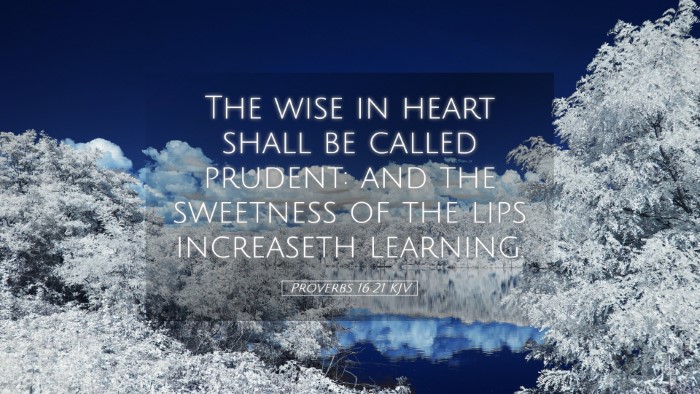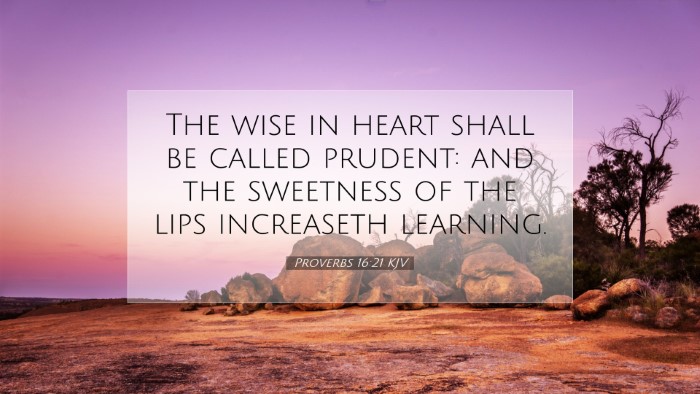Commentary on Proverbs 16:21
Proverbs 16:21 states, "The wise in heart shall be called prudent: and the sweetness of the lips increaseth learning."
Introduction
This particular verse emphasizes the intrinsic connection between wisdom, prudence, and the impact of speech. The proverbs elucidate the value of wisdom and discernment, presenting a profound lesson that resonates across various contexts — personal, social, and spiritual. In this commentary, we will synthesize insights from esteemed theologians and biblical scholars, notably Matthew Henry, Albert Barnes, and Adam Clarke.
The Wise in Heart
The term "wise in heart" suggests an inner wisdom that transcends mere intellectual ability. According to Matthew Henry, true wisdom involves not just knowledge but also a deep understanding and application of that knowledge to one's life. This wisdom is characterized by purity of heart and a genuine concern for the well-being of others. Henry remarks that the heart represents the seat of motives and intentions; hence, a wise heart is one aligned with righteousness.
Called Prudent
To be called "prudent" indicates a recognition by others of one's wise attributes. Albert Barnes notes that prudence denotes a carefulness in decision-making, implying forethought and caution. It embodies the ability to foresee potential obstacles and to devise plans that safeguard against them. In biblical literature, prudence is often associated with wisdom, as it reflects an aptitude for moral reasoning and ethical living.
The Sweetness of the Lips
The phrase "sweetness of the lips" characterizes how wisdom is communicated. Adam Clarke emphasizes the importance of how knowledge and wisdom should be delivered. Sweetness in speech signifies graciousness, kindness, and the ability to articulate thoughts compellingly. This highlights the rhetorical flair that can assist in persuading or enlightening others, showcasing that the manner of delivery can significantly enhance the reception of one’s message.
Increaseth Learning
The latter part of the verse, "and the sweetness of the lips increaseth learning", indicates a profound truth about the nature of wisdom and teaching. Matthew Henry suggests that pleasant speech fosters an environment conducive to learning. When individuals communicate with grace and authenticity, they not only convey information but also invite engagement, curiosity, and respect from others. This dimension of learning transcends mere accumulation of facts, transforming it into a relational and transformative experience.
Wisdom as a Community Asset
In understanding this proverb, we may consider the broader implications of wisdom within community dynamics. Albert Barnes articulates that wise individuals serve as anchors within their communities. Their prudence protects collective interests, while their articulate communication invites collective intelligence. As wise and prudent individuals share knowledge in kind and thoughtful ways, they multiply learning opportunities for those around them, driving personal and communal growth.
Applications for Pastoral Care and Leadership
For pastors and church leaders, this verse provides profound guidelines for engagement within their congregations. Adam Clarke underscores the role of leaders as educators who bear the responsibility of imparting wisdom. Their words should carry sweetness, ensuring that listeners feel valued and respected. This method not only encourages learning but cultivates trust, fostering deeper spiritual growth and community cohesion.
Conclusion
Proverbs 16:21 offers rich insights into the dynamics of wisdom, speech, and learning. The interrelation between having a wise heart, being recognized as prudent, communicating sweetly, and increasing learning is vital for individuals, especially leaders within faith communities. The cumulative wisdom gleaned from scholars like Henry, Barnes, and Clarke emphasizes that understanding and applying these principles can significantly enrich interpersonal communications and enhance the collective wisdom within any community.


